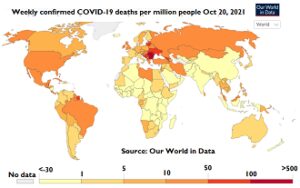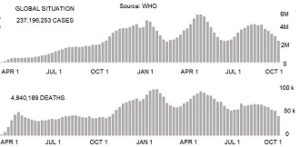
Posts Tagged ‘pandemia’
The meekness in times of polarization
Meekness is a fundamental virtue for resolving conflicts, establishing new spaces for dialogue where it ended and opening new horizons where they seem impossible.
establishing new spaces for dialogue where it ended and opening new horizons where they seem impossible.
John Calvin has a very noble phrase: “It will be useless to teach meekness unless we have started with humility”, in fact the great reason why some seem right and others unreasonable. on the sides (the opposite of humility) and within these parameters, no dialogue will be possible, or what we prefer, no “new horizon” will be drawn that establishes a future point where conflicting points may enter into a process of convergence.
Polarization is inevitable may be the arguments of some, yes if reaching a certain point of conflict this is valid, but we must know that the actual way out of a conflict will have to have the flag of peace at some point and it cannot be the The flag of submission of the vanquished, the pax Romana, after Rome conquers its territories, it is submission to an authoritarian concept that at a certain point will return to war.
Power is always asymmetrical, this is true, but meekness can lead to it being exercised with modesty and justice.
Polarization is logic may be the argument to justify it, but remember that fuzzy logic, paraconsistent logic and other logics are not binary, yes or no, and that there are never only two sides, this is an idealistic position that it induces duality, there can be multiple sides, so the really fair logic admits a third hypothesis.
These will never be winners and will always be by the wayside may be another thought, as paradoxical as the divine teaching may seem, in many religions, is that meekness and humility lead people to high, one of the biblical beatitudes says (Mt 5, 5): “Blessed are the meek, for they will possess the land” and so where is their power, the conquest through perennial values can only lead to plenitude and perenniality itself, the problem is to yield to values tricky and unfair.
The construction of a perennial reality, a time of peace and justice, as we begin to emerge from a pandemic, is fundamental, even if it seems distant.
The Falling Virus as New Concerns
The number of cases in Russia that remained high, new cases emerging in China attributed to the Delta variant, according to data from the country’s own National Health Commission, accused 32 cases in Inner Mongolia, in the north of the country and which has already spread throughout In 11 provinces, cases have been confirmed in Guizhou in the South, Shandong in the East and in Gansu near Inner Mongolia, three cases in Beijing and two in Yinshou, in the Ningxia Hui Autonomous Region.
emerging in China attributed to the Delta variant, according to data from the country’s own National Health Commission, accused 32 cases in Inner Mongolia, in the north of the country and which has already spread throughout In 11 provinces, cases have been confirmed in Guizhou in the South, Shandong in the East and in Gansu near Inner Mongolia, three cases in Beijing and two in Yinshou, in the Ningxia Hui Autonomous Region.
In Brazil the moving average of deaths continues to fall, now in the range of 260 deaths, with 75% having already taken the first dose, and 55% the necessary doses, it is possible to predict a Christmas and a milder end of the year of the Pandemic in the country, many collective events are already released, games with 100% of the fans and parties and public shows.
The concern now turns to social problems arising from the pandemic, unemployment, impoverishment and rising prices. Even if some social aid does come, it will be insufficient to contain the spread of the crisis.
The closing of downtown offices, the mandatory use of masks and the restrictions imposed on restaurants have transformed landscapes into cities around the world, and are likely to continue in the long term, such as rethinking urban space, what to do with office buildings , closed stores and restaurants in the city centers, smart cities showed paths with a trend, apparently only electronic, now it seems inevitable, in Singapore even policing is done by robots (photo).
The immense empty spaces must be preserved and cared for, without robots the cost is high for a small population, so in many cities they will either remain abandoned centers or they will have to develop more computerized forms of maintenance and policing, in addition to the existing cameras.
It is likely that a reasonable number of people return to the routine of agglomerations in large centers, but there is a tendency to go to smaller cities or leave urban centers and work at home.
The divine environment and the human phenomenon
Chardin’s worldview on the human phenomenon ranges from cosmogenesis, the origin of the universe and of life to the complexification of nature and the place of man in it, what the pandemic shows is that this complexification grows and even science has limits to deal with it, however, this pandemic can bring new horizons, when it thinking and clarifying it needs science.
cosmogenesis, the origin of the universe and of life to the complexification of nature and the place of man in it, what the pandemic shows is that this complexification grows and even science has limits to deal with it, however, this pandemic can bring new horizons, when it thinking and clarifying it needs science.
Among his various works, Teilhard Chardin makes a singular journey between The divine environment, written between November 1926 and March 1927 and the Human Phenomenon, written between July 1938 and June 1940, which form an “inseparable whole” also says edition I have of Editorial Presença de Lisboa, Portugal.
Singular because it transits from the divine to the human, as the names of the works attest, without slips or ravages, it shows us the “need for the connection between science and religion equally affirmed by Einstein”, an expression by Helmut de Terra, friend and admirer of Chardin. Chardin initiates the divine environment by realizing “the confusion of religious thought in our time” (page 41) and attests that the man of our time “lives with the explicit awareness of being an atom or a citizen of the Universe” (idem).
The timeliness of the text is because the author affirms at the beginning of his book something that has a lot to do with our days, a collective awakening that a beautiful day “makes each individual aware of the true dimensions of life, necessarily provokes in the human mass a profound religious shock, both to slaughter and to exalt ”(ibidem).
This is because the world is too “beautiful: it is to him and only to him that they should worship” (p. 42). What is then the “divine environment”, the world (in our case we explore the universe’s worldviews) will not be more and more fascinating and it would not be and it would be “eclipsing our God” (idem), and there is a connection, in the view of part of Christianity, between God and matter, the Eucharist, she and she alone can create a real sense of reconnecting us to the divine, “this is my body and my blood” said Jesus, and those who eat will have access to eternal life.
Chardin says “the slowly accumulated tension between Humanity and God will reach the limits set by the possibilities of the World, and then it will be the end” (p. 177)… that we must wait not as a catastrophe but as an“ exit ”to the world to which we must collaborate with all our Christian forces without fear of the world, because his enchantments could no longer harm those for whom he became, in addition to himself, the Body of the One who is and the One who comes ”.
Chardin, Teilhard. (no year). O meio edivino: ensaio sobre a vida interior (The divine environment: I teach about the inner life). Lisbon: Editorial Presença.
Falling, but the pandemic is not over
We mentioned last week the concern about evolving cases in some countries such as Russia and England, where a variant of the virus is being studied with concern, also the poorest countries have received fewer vaccines than promised by donation, and we already understand that Pandemic is global, that is, there is an influence of less vaccinated regions in others that maintain a high level of immunity, policies for future pandemics already take these factors into account.
some countries such as Russia and England, where a variant of the virus is being studied with concern, also the poorest countries have received fewer vaccines than promised by donation, and we already understand that Pandemic is global, that is, there is an influence of less vaccinated regions in others that maintain a high level of immunity, policies for future pandemics already take these factors into account.
Some countries continue with a high level of deaths, despite vaccination, in the US around 1700 daily deaths in the last week, in the rest of the world it is falling, but with the presence of deaths, in the graph above with deaths registered on the 23/ 10 (Saturday) in absolute number of deaths, Brazil, followed by India, Mexico and then Russia.
The major concern of WHO is with respect to promises of vaccine donations to the poorest countries that are not being fulfilled. the news is not from this blog, but from the WHO itself, as it has positioned itself against the third dose, as according to The People’s Vaccine report made on the BBC, an alliance of a charity institution reported that only one in seven doses of vaccines promised by companies and rich countries, in fact reached the poorest nations.
In the report, in the interview with Bruce Aylward he stated: “Do we really need to step up or do you know what’s going to happen? This pandemic will last another year than it needs to,” he warned, and this is due to the fact that even with isolation measures we are always connected, and any communication (not only of people, but of products and any biological material such as fruits and food) can be transmitter.
In Brazil, the number of vaccine doses is coming, a boost in the vaccination campaign against Covid 19, a batch of 1.7 million Pfizer/BioNTech vaccines arrived on Friday (10/22) and other equal amounts had already arrived, totaling almost 5 millions of vaccines.
The inputs for AstraZeneca were also received by FioCruz (Brazil), which produces the vaccine in the country, the landing of the Active Pharmaceutical Ingredient (API) arrived for the production of 5.6 million doses with arrival scheduled for 5:50 am on Sunday morning (25/10).
Vaccination in the first dose reaches close to 153 million doses, while the second dose (or single dose) reached just over 109 million vaccinated, the moving average of deaths is just above 300 daily deaths, with a downward trend we can assume that we will be below 100 daily deaths in early December.
Mass culture and its criticism
In Morin’s book “The Mass Culture of the Twentieth Century”, it is stated that there is a zone “where the distinction between culture and mass culture becomes purely formal: The Human Condition, Nausea or The Plague enters the culture of mass without, however, leaving the cultivated culture” (Morin, 1997, p. 53) and Camus’ book is interesting for its coincidence with the issue of the current Pandemic, and interesting that it did not enter into the analysis of the cultural aspect of the moment.
it is stated that there is a zone “where the distinction between culture and mass culture becomes purely formal: The Human Condition, Nausea or The Plague enters the culture of mass without, however, leaving the cultivated culture” (Morin, 1997, p. 53) and Camus’ book is interesting for its coincidence with the issue of the current Pandemic, and interesting that it did not enter into the analysis of the cultural aspect of the moment.
We have already posted on the blog at another time about Camus’ book “The Myth of Sisyphus” and oher about José Saramago’s novel Essay on blindness (1995), although widely read in some European countries amidst the pandemic, his analysis was not entered the circles of cultural “high narrative”, that we tried to explain in some posts this week.
Written in 1947 by the weak Algerian Alberto Camus, its origin is important, because its chronicle starts from an analysis of an epidemic that occurred in the Algerian city of Oran, in some year of the 1940s, when Camus worked clandestinely in the clandestine newspaper “ Combat!” where he wrote texts engaged against Nazism, among them “Letters to a German Friend” (1945) stand out.
The book deals with the absurdity of existence, when in the midst of an epidemic there is a lack of love and human solidarity, whose feelings can be summarized where he wrote: “There were common feelings, such as separation or fear, but the personal concerns.
No one had yet truly accepted the disease”. Another excerpt that can be highlighted: “Many continued to hope that the epidemic would cease and that they, with their families, would be spared. As a result, they still didn’t feel obligated to do anything.
The plague was nothing more to them than an unpleasant visitor who would one day depart. Frightened but not desperate, the moment had not yet come when the plague would appear to them as the very form of their life and when they would forget the existence they had been able to lead until then.”
With the war just over in the period that he wrote the book, he remembers: “The scourges, in fact, are a common thing, but it’s hard to believe in them when they befall us. There were an equal number of pests and wars in the world. And yet, plagues, like wars, always find people equally unprepared.”
He shrewdly analyzes the scourges in history: “From the beginning of history, the scourges of God have brought the proud and the blind at his feet. Meditate on this and I fell to my knees.” and adds: “Oh, if it were an earthquake! A good shake, and there was no more talk about it… counting the dead, the living, and that was it. But this damn disease! Even those who don’t catch it seem to carry it in their hearts.”, and his conclusion brings a reflection: “The more the pandemic spreads, the more the moral will become elastic.”
I understood that the absence of solidarity and compassion, as well as the elasticity of morality were not unusual facts in epidemics, but somewhat expected, but I would add that there is always a more humane, more solidary alternative that gives us the hope of a much more just after a sad scourge, learn something from it.
Covid falls and worrying cases
Covid 19 already shows signs of decline worldwide, but there are still  worrying cases such as Russia, the first country to launch a vaccine and had on Saturday (16/09) more than a thousand deaths from Covid 19, the reasons are several, the main thing is the low rate of vaccination, Russia reached 218,362 thousand deaths for a population of 145 million inhabitants.
worrying cases such as Russia, the first country to launch a vaccine and had on Saturday (16/09) more than a thousand deaths from Covid 19, the reasons are several, the main thing is the low rate of vaccination, Russia reached 218,362 thousand deaths for a population of 145 million inhabitants.
The whole world has almost 48% at least one dose and just over 36% fully immunized, it is possible to consider that we are not out of danger, something around 60% would be desirable, at least until the end of the year for the Christmas parties , in Brazil the number of vaccinees is 73.4% at least one dose and close to 50% fully vaccinated, but the infection curve still drops very slowly.
The consequences of Variant delta are not yet known, in a balance made of the pandemic by neuroscientist Miguel Nicolelis, he stated that in Brazil we have not yet seen the face of this variant.
Winter is approaching in the Northern Hemisphere and the WHO intends to consider the possibility of a new pandemic, so that we are not surprised as this one has not ended, in November it will hold a World Health Assembly where it will study the possibility of a “treaty for pandemic”, it is necessary to consider greater solidarity and more effective combat.
The deputy director of WHO Mariângela Simão was emphatic: “there will be a next pandemic”, and added: “This is something we already know and which is inevitable, it’s a question of when it will happen” said according to the Instituto Paulista of Medicine.
Simão alerts that there is no approved vaccine yet for children, so there cannot be a national policy using vaccines that have not been approved for children under 12 years of age, and he points out that we only have one vaccine approved for use by adolescents from 12 years of age, which is the Pfizer.
He highlighted the importance of the Covax consortium that helped vaccination in poor countries, stressing the importance of donating 500 million doses from Pfizer, which will allow the entry of 200 million doses from Pfizer this year, France also made available the make donations and more countries are expected to help because, for now, it is the only vaccine for teenagers.
Good news and caution
Five Brazilian states did not register death by Covid 19 in the last 24 hours, but it has already exceeded 600,000 deaths and accounts for 21,575,820 infections, the moving average is below 500 deaths and more than 60% of the adult population has already received both doses or single dose of the vaccine.
last 24 hours, but it has already exceeded 600,000 deaths and accounts for 21,575,820 infections, the moving average is below 500 deaths and more than 60% of the adult population has already received both doses or single dose of the vaccine.
The main danger is that the stress of the period of sanitary measures causes a relaxation in the population, sanitary measures are still mandatory and this is the right time not to relax and be resilient.
The precaution is due to the worldwide problem of the pandemic, the WHO global data indicate 52,929 infections yesterday with a weekly drop of 17.64% and a total of 818 deaths (more than 42 in the week) with a weekly drop of 21.26% (see chart), both more pronounced than in previous weeks.
In many countries there is already a relaxation in sanitary measures, it is necessary to be aware that this affects the whole world, as flights and global mobility start to be relaxed, and without the precautionary measures taken by everyone, it can make the fall more slow, and it is also necessary to remember late autumn and early winter in the northern hemisphere.
Sanitary precautions such as washing your hands and continuing to wear masks and alcohol gel, avoiding crowds and distances when in collective activities (public transport remains a problem), and avoiding the usual end-of-the-year consumerism problem.
A more dignified and less sumptuous Christmas will be more worthy of the date and will avoid the desperation of traditional spending and consumption at the end of the year.
May the return to normality also be a return to serenity, empathy and solidarity.
Erasure, invisibility and politics
 It is not ignored in history the fact that the state, being a “possible” solver of conflicts, has taken for itself the right to violence, which in the last instance is the right to kill.
It is not ignored in history the fact that the state, being a “possible” solver of conflicts, has taken for itself the right to violence, which in the last instance is the right to kill.
Cameroon philosopher Achille Mbembe took this extreme of state power to develop his thesis on the state’s right to kill, calling this policy “Necropower”.
The essay was translated into Portuguese in 2018, and at the heart of this essay is a question about who can live or die in the contemporary world? Mbembe denounces that the role of States should have the defense of the lives of the most vulnerable as a principle, and not what is structurally done, which is the erasure of memory and the conditions of these lives.
We see that, beyond the erasure, there is a permanent invisibility of these people, by a layer that is linked to power, reaching the limit of not having civil registration and cultural rights.
Approached with regard to the forgetfulness (or social invisibility) and silencing made by the State regarding the historical past of these vulnerable groups, it is beyond the academic field, the social, cognitive and identity memory of what was experienced in the past and which is shameful not only through oblivion and invisibility, but made from a narrative opposite to its memory.
If we look from complex thinking, which etymologically means tissue together (complexus), the biological term “necrosis” refers to issues involving the biological death of bodily tissues or part of them, thus, one cannot think of the death of a part without let the whole body suffer, even though it does not look to see the tissue that is failing.
It is important to address the complexity of this concept of necropolitics and invisibility, because only it can address the problems involving racism, sexism and the erasure of different cultures (such as the indigenous, but there are many others in the contemporary world), the already known and unresolved economic dimension, which is access to social goods and services, joins the political dimension (the spaces of power), the construction of narratives and historicity of subjugating cultures (the psychological dimension) and the comprehensive cultural dimension.
Starting from the misery and invisibility of peoples, cultures and races, it cannot deny structural factors that are strong and prevent a more sustainable change of peaceful and harmonious coexistence.
Of course, the panorama is not just national or Latin America, the brake on economic activities and mainly disorganization, facing the crisis in the economic aspect, when there was one, was just adopting emergency measures and not senatorial or preventive measures.
It is expected that there will be living forces capable of recovering social levels, without forgetting the aspects of distribution and preservation of the environment, which ultimately are the means for production and food and economic development.
Falling, but care must be taken
After a legendary pandemic fall in Brazil, Saturday the curve was below 500 deaths in the last 24 hours, the deaths reaching almost 600 thousand since the beginning of the pandemic, indicate that there is still danger and the flexibility that is already happening for massive public events is worrisome.
was below 500 deaths in the last 24 hours, the deaths reaching almost 600 thousand since the beginning of the pandemic, indicate that there is still danger and the flexibility that is already happening for massive public events is worrisome.
It’s important to remember that on September 13th the moving average was 465.’ and then it went up.
We already explained last week that a “aftermath” is needed and that the proximity of the holidays and the end of the year can worry us, I remember the case of Portugal last year, which relaxed on these dates and had an increase in January, the countries that are in the beginning of flexibilization have really low rates of infection and mortality and the regions of contagion are observed.
The vaccination of the first dose already 40% (93,271,450 immunized and 147 million first doses), the vaccine delay rate in Brazil is 11%, according to the bulletin VigiVac of the Oswaldo Cruz Foundation, Brazil.
The Bulletin points out the states with the greatest delay, Ceará with 33% and the smallest Rio Grande do Norte with 5.4%, also note the absence for the second dose, in absolute numbers, São Paulo 1.25 million, in Rio de Janeiro 956.9 thousand people did not show up for the second dose and in Bahia 907.5 thousand people, the State with the highest vaccination is São Paulo with 79.20% in the first dose when it is not the only one and the lowest is Pará with 50, 91% took a dose.
Vaccines also had delays in delivery, Coronavac 33%, AstraZeneca 15% and Pfizer with a lower rate of 1%, which is why it has been the most applied in many cases in the third dose.
Pfizer entered more than 1 million doses this Saturday at Viracopos airport and promises to deliver up to 10 million on four charter flights that will arrive in the next few days.
Flexibility should advance in reliable numbers, taking serious control measures, for example, isolation in sporting events, in shopping malls and in means of transport.
Science with conscience
A tiny virus challenged us and put us in front of a serious pandemic, a volcano that erupts and whose end even volcanologists and geologists still see as unpredictable.
a volcano that erupts and whose end even volcanologists and geologists still see as unpredictable.
The great mark of contemporary science is the end of certainties, the uncertainty principle first announced by Heisenberg and then certified by research in particle physics and astrophysics, Karl Popper developed the principle of falsifiability for science and Gödel’s Paradox says that no axiological system can be complete and consistent at the same time.
This should return us to humility, the Enlightenment does not mean that science has triumphed, but that it has discovered its limits and that it must give space to ethics and a humanism that completes man beyond his rationality.
Edgar Morin wrote “Science with a conscience”, presents a double challenge: it points out the ethical and moral problems that contemporary science has, whose multiple and prodigious powers of manipulation impose on scientists and citizens, and in a certain way, the entire humanity problem. political and private control of the discoveries.
According to Morin, the concepts of progress and knowledge that are related must be reordered, so progress is not reduced to the organization of economic development, and knowledge is not restricted to providing information, but also to overcoming theoretical social structures that condition their configuration to a way of thinking.
He clarifies on pages 9 and 10 that “the classic dogma of separation between science and philosophies, the sciences of this century all encounter fundamental philosophical questions: “what is the world? the nature? life? The man? reality?) and that the greatest scientists since Einstein, Bohr and Heisenberg have turned into wild philosophers.” (MORIN, 2005).
Remember in the preface also the precept of Rebelais: “Science without conscience is only the ruin of the soul.” (p. 9).
MORIN, E. Science without a conscience. Editing revised and modified by the author. (Translation by Maria D. Alexandre and Maria Alice Sampaio Dória). 9th Ed. Rio de Janeiro: Bertrand Brasil, 2005.

